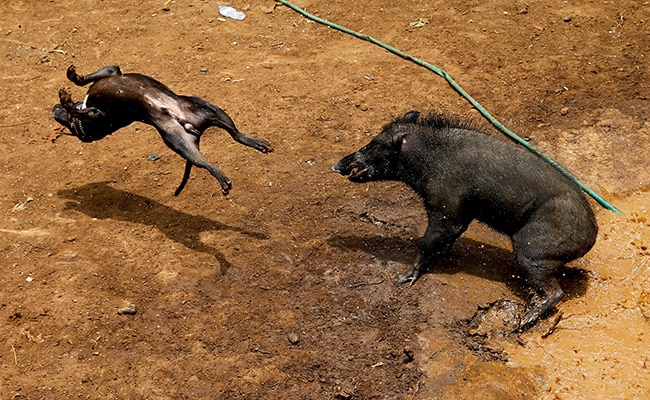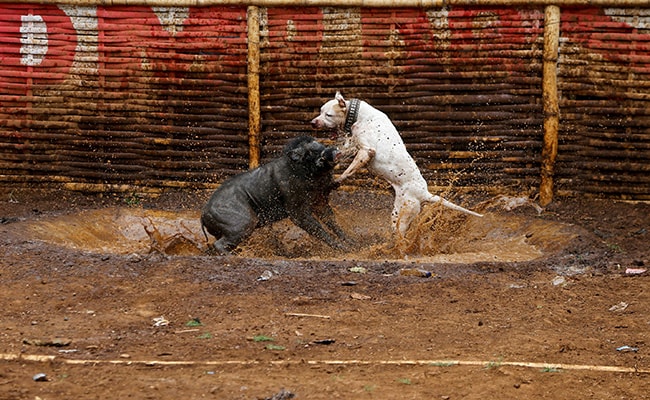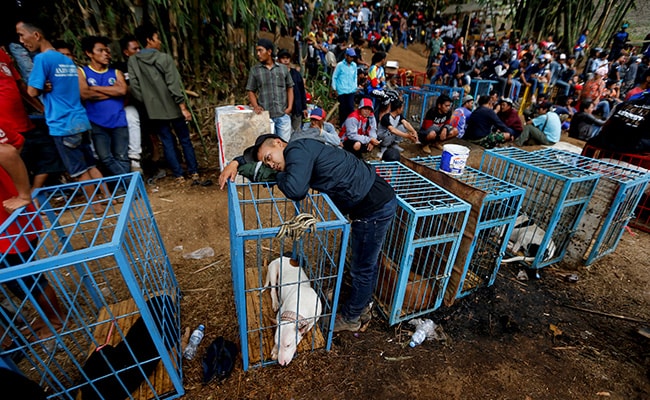
Animal Rights activists are up in arms against the wild boar fights, which began in the 1960s (Reuters)
Cikawao, Indonesia:
A gory fight to the death between snarling dogs and captured wild boars.
Gathered around a bamboo-walled arena, Indonesians in this remote part of Java island seem eager to watch the blood-curdling contests, known locally as 'adu bagong' (boar fighting).
Not surprisingly, animal rights activists are up in arms against the regular spectacle, which began in the 1960s when wild pig numbers in this area in West Java soared and they were hunted to protect crops.
 Participants told Reuters the fights were a way to preserve a tradition of hunting in the area. There's also a cash prize of up to $2,000 for the winning dog.
Participants told Reuters the fights were a way to preserve a tradition of hunting in the area. There's also a cash prize of up to $2,000 for the winning dog.
"It used to be very simple, not like now when the dogs are trained," said Nur Hadi, head of Hiparu, a group of hunting dog enthusiasts that takes part in the fights.
"From there it's been handed down and has even become part of tradition and culture," Hadi told Reuters.
 He defends the practice against criticism from animal rights groups, who say it should be banned.
He defends the practice against criticism from animal rights groups, who say it should be banned.
"It is a criminal act against animals," said Indonesian animal rights activist Marison Guciano.
"The government and NGOs should go to the field to stop this event and educate the people that dog fighting is not right."
The fights take place in a 15-by-30 metre (50 ft by 100 ft) arena surrounded by a bamboo fence to protect spectators, and only end when one of the animals is injured.
 Participants say the contests test the agility and hunting abilities of the dogs. If a boar survives a fight, once healed it will be returned to the arena to fight another day. If not, it will be butchered and sold for meat.
Participants say the contests test the agility and hunting abilities of the dogs. If a boar survives a fight, once healed it will be returned to the arena to fight another day. If not, it will be butchered and sold for meat.
Dog breeder Agus Badud says the tradition also gives people a source of income.
"I take part in this contest to increase the selling price and economic value of my dogs, and it would be useless for me as a breeder if I did not participate in a contest like this," Badud said in his house where he keeps 40 dogs.
Dog owners pay anywhere from 200,000 rupiah to 2 million rupiah ($15 to $150) to enter the fights, depending on the size of their dog.
(This story has not been edited by NDTV staff and is auto-generated from a syndicated feed.)
Gathered around a bamboo-walled arena, Indonesians in this remote part of Java island seem eager to watch the blood-curdling contests, known locally as 'adu bagong' (boar fighting).
Not surprisingly, animal rights activists are up in arms against the regular spectacle, which began in the 1960s when wild pig numbers in this area in West Java soared and they were hunted to protect crops.

The blood-curdling fights are known as 'Abu Bagong' (boar fighting) in Indonesia (Reuters)
"It used to be very simple, not like now when the dogs are trained," said Nur Hadi, head of Hiparu, a group of hunting dog enthusiasts that takes part in the fights.
"From there it's been handed down and has even become part of tradition and culture," Hadi told Reuters.

The fights are seen by villagers as a means of preserving tradition (Reuters)
"It is a criminal act against animals," said Indonesian animal rights activist Marison Guciano.
"The government and NGOs should go to the field to stop this event and educate the people that dog fighting is not right."
The fights take place in a 15-by-30 metre (50 ft by 100 ft) arena surrounded by a bamboo fence to protect spectators, and only end when one of the animals is injured.

A cash prize of $2,000 is handed out to the winner (Reuters)
Dog breeder Agus Badud says the tradition also gives people a source of income.
"I take part in this contest to increase the selling price and economic value of my dogs, and it would be useless for me as a breeder if I did not participate in a contest like this," Badud said in his house where he keeps 40 dogs.
Dog owners pay anywhere from 200,000 rupiah to 2 million rupiah ($15 to $150) to enter the fights, depending on the size of their dog.
© Thomson Reuters 2017
(This story has not been edited by NDTV staff and is auto-generated from a syndicated feed.)
Track Latest News Live on NDTV.com and get news updates from India and around the world

